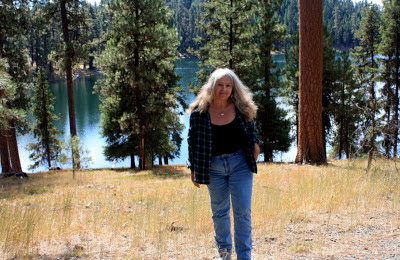photo taken at an Eastern Oregon lake -- general locale of the book I am currently writing on the John Day country and the Snake Indian wars.
My pattern appears to not appeal to a lot of romance readers. Having had books available for eReaders for just over a year, having given away many books (and by now I am not sure how many but over 15,000 and probably way over), I have to accept that my pattern to stories doesn't appeal to those who took the free books. I have sold books, more than I expected some months, but there is never any way for me to figure out why they did or did not sell.
Of course, since they are not yet out, I don't know yet about my historicals, but I suspect the same thing may be true. They definitely do not fit any of the patterns I described in the previous blog.
a bit south of where the John Day story takes place
I do have a pattern of writing, of the bare bones of a story that I will flesh out. Although I can start with the characters, it's not the only way I get an idea. Sometimes it's a subject that interests me like say the adult ramifications of childhood abuse on a male. I research what happens emotionally to such a man, how would that impact his relationships and his choices if he hadn't gotten counseling to work through what happened.
When I decide on my main protagonists, I always pick ones I can like. They may have flaws, flaws are good, but basically, I will like the idea of spending months with these people.
When I begin writing, I have these two people in mind, where I want the story to go as I set them into the problem. Sometimes the reader might not be aware what the real issue is because, as with life, something superficial will be overshadowing it (that was the case for instance with Her Dark Angel).
My goal is to write stories that are fiction but based on truth in life. I like to write dialogue that reads well and seems it would have come out of the character's mouth. I want an emotional story but not full of angst and misery. I like an adventure, some danger, and I want strong endings. I like to write about healthy sexuality. Finally I want lessons for life woven into the characters' experiences.
I am not into tragedies and won't spend my time writing or reading stories about horrible people. I admire that Stephen King is so successful and a talented writer, but I could not immerse myself in horror or nasty people and not find it impacting my daily life. I think I get all the angst I want from ranch living.
The problems of livestock--. She's our cow, got out of our pasture and did NOT want to go back--. photo from last summer
Whether you are writing chick lit at this point, sci fi, the great American novel, here is where you, as well as me, must sell yourself. You have to have that reader interested enough in your life and knowledge that they know, through this fiction work, they will get something they can take away with them
What right do you have to write that story is the question that your own life can answer-- or not.
When I think about my own life, it's been a diverse one and yet it's stayed within a region-- the American West. I have in some ways led almost multiple lives within one lifetime even though it all looks to be heading down the same road. I know about love because I have both lost and won at it. I know about relationships because I have succeeded and failed at them. I know about life and death because family and ranch living teaches you that. I know about love of the land and what that means to a life. I know about a creative life because I have lived one from childhood. My spiritual background is like someone who wasn't the same person every twenty years for what I believed and how I saw life. I have been a lifetime observer and student, as whatever interests me, I want to learn what I can about it.
There are people who basically stay where they are and their set of beliefs thirty years later won't change. I am not sure mine will be the same even in a year. I don't know they won't. I am content living with that flexibility. I didn't need to have all the answers even though at one time I thought I had them.
the only way to get dragonfly photos-- patience
I am not sure how I tell readers any of that in a way that actually works to sell my books, but I am thinking about it. When I got to thinking about this whole issue, I remembered my creating of a Dipity timeline in 2008, that tells a tiny piece of my own life story through images and a couple of outside influences--
Does any of that show from where my stories come and why a reader should trust me with their hours spent to read them? I do think that believing in a writer is one reason readers will buy and read their books. And finding a way to tell our own story is part of how they might come to do that




